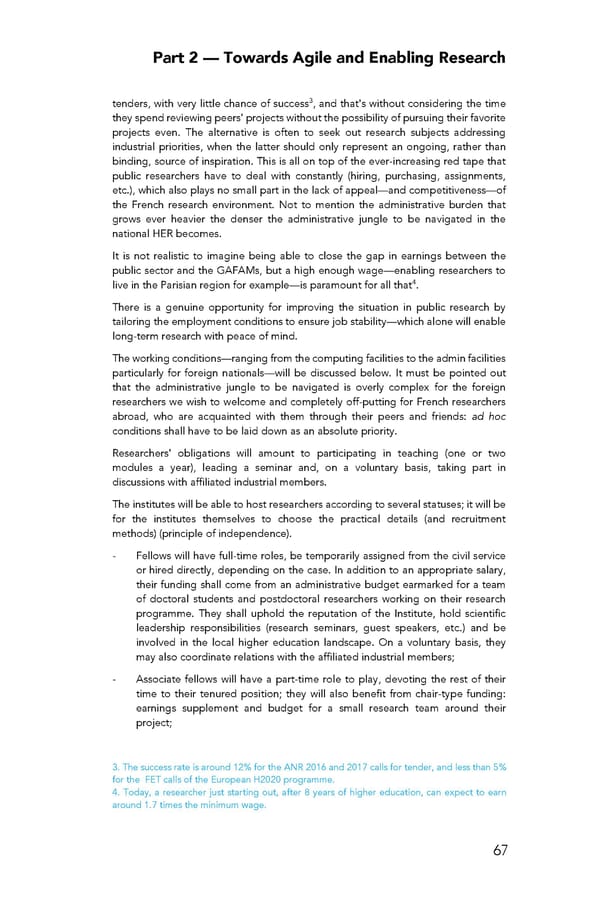Part 2 — Towards Agile and Enabling Research tenders, with very little chance of success3, and that's without considering the time they spend reviewing peers' projects without the possibility of pursuing their favorite projects even. The alternative is often to seek out research subjects addressing industrial priorities, when the latter should only represent an ongoing, rather than binding, source of inspiration. This is all on top of the ever-increasing red tape that public researchers have to deal with constantly (hiring, purchasing, assignments, etc.), which also plays no small part in the lack of appeal—and competitiveness—of the French research environment. Not to mention the administrative burden that grows ever heavier the denser the administrative jungle to be navigated in the national HER becomes. It is not realistic to imagine being able to close the gap in earnings between the public sector and the GAFAMs, but a high enough wage—enabling researchers to live in the Parisian region for example—is paramount for all that4. There is a genuine opportunity for improving the situation in public research by tailoring the employment conditions to ensure job stability—which alone will enable long-term research with peace of mind. The working conditions—ranging from the computing facilities to the admin facilities particularly for foreign nationals—will be discussed below. It must be pointed out that the administrative jungle to be navigated is overly complex for the foreign researchers we wish to welcome and completely off-putting for French researchers abroad, who are acquainted with them through their peers and friends: ad hoc conditions shall have to be laid down as an absolute priority. Researchers' obligations will amount to participating in teaching (one or two modules a year), leading a seminar and, on a voluntary basis, taking part in discussions with affiliated industrial members. The institutes will be able to host researchers according to several statuses; it will be for the institutes themselves to choose the practical details (and recruitment methods) (principle of independence). - Fellows will have full-time roles, be temporarily assigned from the civil service or hired directly, depending on the case. In addition to an appropriate salary, their funding shall come from an administrative budget earmarked for a team of doctoral students and postdoctoral researchers working on their research programme. They shall uphold the reputation of the Institute, hold scientific leadership responsibilities (research seminars, guest speakers, etc.) and be involved in the local higher education landscape. On a voluntary basis, they may also coordinate relations with the affiliated industrial members; - Associate fellows will have a part-time role to play, devoting the rest of their time to their tenured position; they will also benefit from chair-type funding: earnings supplement and budget for a small research team around their project; 3. The success rate is around 12% for the ANR 2016 and 2017 calls for tender, and less than 5% for the FET calls of the European H2020 programme. 4. Today, a researcher just starting out, after 8 years of higher education, can expect to earn around 1.7 times the minimum wage. 67
 For a Meaningful AI - Report Page 67 Page 69
For a Meaningful AI - Report Page 67 Page 69